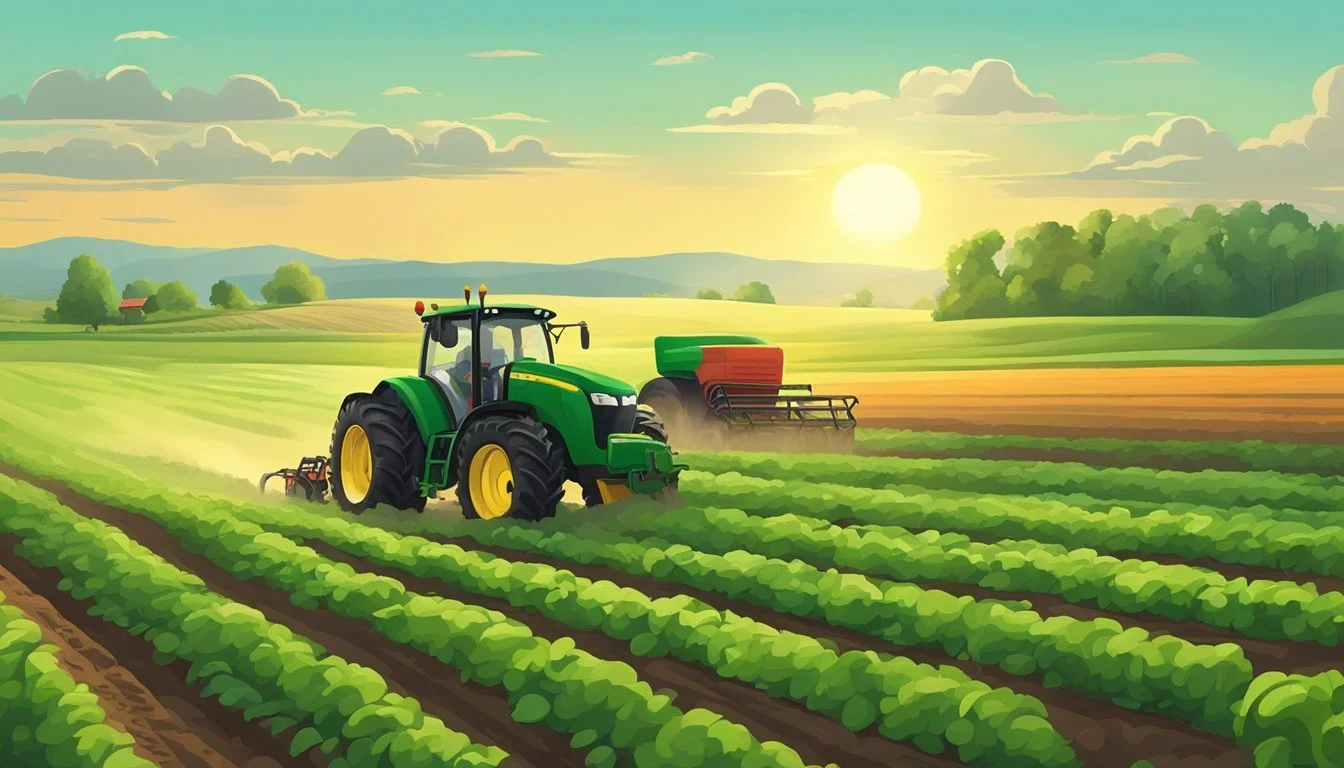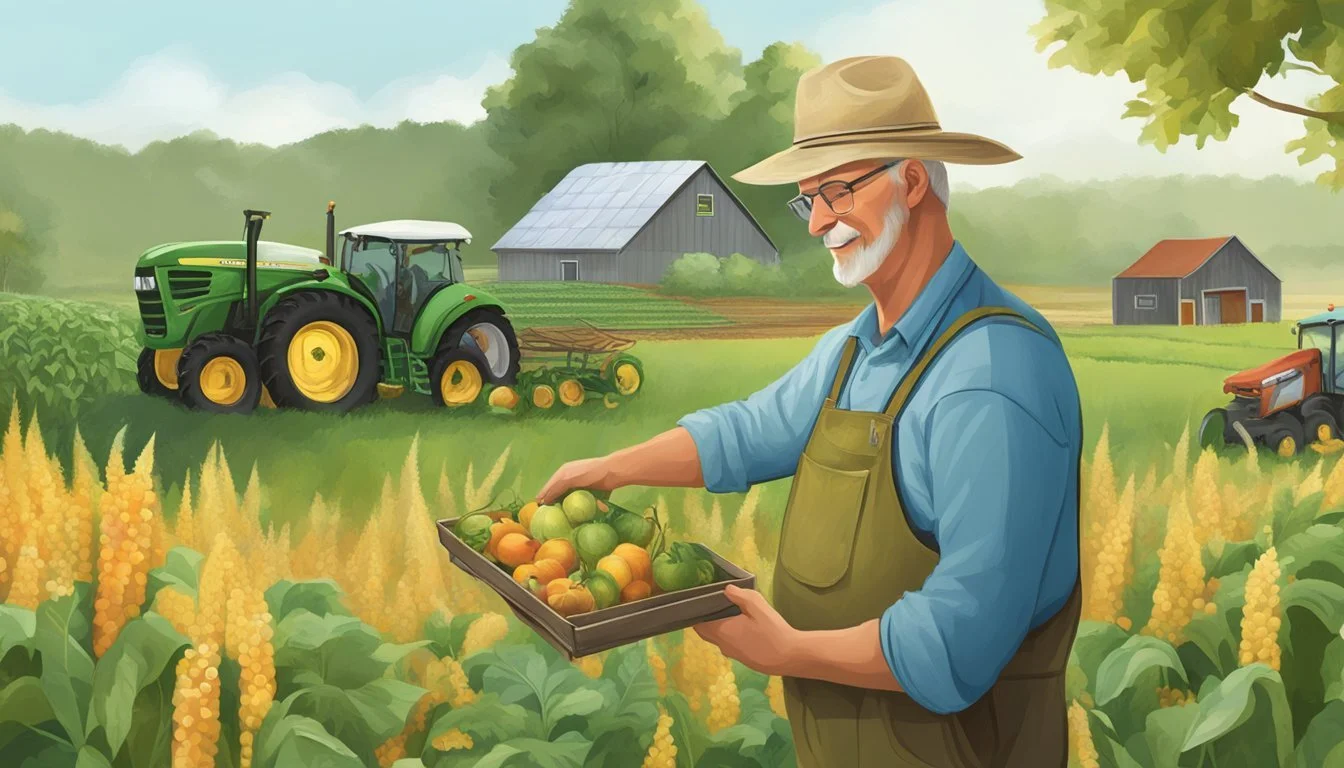Farming Grants Michigan
Securing Funds for Sustainable Agriculture
Michigan's agricultural sector is a vital component of its economy, and the state continues to offer various grant opportunities aimed at supporting and advancing farming practices. These grants are designed to foster innovation, address practical challenges, and encourage sustainable agriculture. Funding programs often prioritize areas such as climate-smart practices, agricultural processing, and the enhancement of the supply chain. By leveraging these resources, Michigan aims to fortify its food and agricultural industry against contemporary and future challenges.
Eligibility for these grants may extend to individual farmers, ranchers, educators, and nonprofit organizations, all striving to contribute to the state's dynamic agricultural landscape. Specific grants, such as the Farm Innovation Grant Program, provide financial support for innovative solutions and practices. Other programs, such as those run by the USDA Farm Service Agency, offer emergency funding for land rehabilitation post-natural disasters and drought-related water conservation measures. Concessions are also available for groups or individuals focusing on sustainable farming practices, underscoring Michigan's commitment to environmental stewardship and agricultural longevity.
Overview of Farming Grants in Michigan
Michigan's agricultural sector benefits from various farming grants designed to support innovation, sustainable practices, and economic growth. These grants provide crucial funding and resources to Michigan farms, enhancing their productivity and viability.
Types of Farming Grants
Innovation Grants: Aimed at developing solutions for immediate and future challenges in agriculture, like the Farm Innovation Grant Program. These cover areas such as climate-smart practices and supply chain improvements.
Research and Education Grants: These grants cater to on-farm research and farmer education, promoting environmentally sound, profitable, and socially responsible farming systems. Grant amounts can range from $10,000 to $250,000.
Organic Farming Grants: Offered by organizations like Ceres Trust, these grants focus on organic agriculture research and education for careers in organic food production.
Federal Partnership Grants: Facilitated through state programs, such as those in partnership with the USDA Farm Service Agency, they offer significant funding, with a maximum loan amount up to $300,000, targeting specific groups such as beginning farmers.
Planning and Working Capital Grants: These can have maximum allotted amounts, typically up to $75,000 for planning grants, and up to $200,000 for working capital grants.
Each type of grant has specific eligibility criteria and objectives, tailored to meet the needs of Michigan's diverse farming community. Farmers and agribusinesses are encouraged to seek these opportunities to innovate, grow, and contribute to the state's robust agricultural economy.
Eligibility and Application Process
In Michigan, farm innovation grants are a pivotal resource for educational institutions and technology centers looking to advance agricultural practices. These opportunities emphasize the importance of eligibility criteria and a structured application process.
Qualification Criteria
Grants from the State of Michigan are open to a wide range of entities within the state, including:
Universities
Colleges
Community Colleges
Technology Centers
Technology Incubators
Research Centers
These grants are designed to support both established and beginning farmers, as well as ranchers, fostering innovation in the agricultural sector. Eligibility often includes requirements such as being located within the state and focusing on projects that benefit the state's agricultural landscape.
Application Steps
The application process for obtaining a farm innovation grant in Michigan typically follows these steps:
Review Grant Criteria: Applicants must thoroughly review the grant criteria, ensuring their project aligns with grant objectives. All required materials and guidelines are accessible at the state's designated grants website.
Access the MiAgGrants System: The Michigan Department of Agriculture and Rural Development has launched MiAgGrants, a platform designed to streamline the application process, making it more accessible.
Prepare Necessary Documentation: Critical documentation, potentially including project proposals, budgets, and benefit analyses, must be compiled.
Submit the Application: Applicants should submit their completed application through the MiAgGrants system before the specified deadline.
It is important for applicants to follow each step with attention to detail to increase their chances of securing a grant. The application process is competitive, and careful adherence to the procedure is crucial.
Federal and State Funded Programs
In the realm of agriculture, both the federal government and the state of Michigan provide various grant opportunities aimed at fostering innovation and development in farming. These programs are critical for supporting the state's agricultural sector and addressing pressing issues such as climate change and supply chain sustainability.
USDA Grant Programs
The United States Department of Agriculture (USDA) administers several grant programs to assist farmers, with a specific focus on beginning farmers and socially disadvantaged groups. They set aside funds within their direct farm ownership loans, with the maximum loan amount being $300,000. These initiatives are part of the legislation under the Consolidated Farm and Rural Development Act (CONACT), specifically sections 346 and 355.
Michigan State Grants
Michigan's own Department of Agriculture and Rural Development offers the Farm Innovation Program. This state-funded initiative supports in-state educational and research institutes to create innovative solutions for current and future challenges within Michigan's food and agricultural industry. The program prioritizes areas such as Climate Smart Practices. Additionally, the Rural Development Fund Grants program follows a yearly cycle with the 2024 round of grant applications having closed on January 9, 2024.
Financial Support for Farm Operations
Michigan's agricultural sector offers targeted financial support for farm operations through various programs, each designed to enhance farm income, offer capital assistance, and bolster risk management strategies.
Loans and Credit Opportunities
The State of Michigan provides financial assistance to farmers seeking to innovate and develop their operations. Relevant programs offer income support and loans aimed at fostering farm resilience. Specifically, Farm Innovation Grants are allocated to promote climate-smart practices within the industry. Additionally, the USDA Farm Service Agency administers programs for the state, delivering crucial loan facilities. A key offering includes:
Maximum Loan Amount: $300,000 available under special loan programs.
Targeted Support: Portions of these funds are earmarked for beginning farmers and socially disadvantaged groups, addressing the need for accessible capital among these communities.
Risk Management
Management of financial risk is an integral part of farm operation support. Grant programs in Michigan are tailored to address immediate and future challenges in the agriculture sector. The focus lies on areas such as:
Climate Smart Practices: Innovative solutions to counteract environmental risks to income and operations.
Farm and Agriculture Processing: Strategies to stabilize the supply chain, thereby managing market-related risks.
These initiatives reflect a commitment to underpinning farm stability and economic growth within Michigan's diverse agriculture industry.
Educational Resources and Development
In Michigan, the state fosters agricultural advancement through support for education and professional development specific to the agriculture sector. These initiatives are designed for educators and researchers to bring forth innovative farming practices and sustainable agricultural solutions.
Professional Development Grants
Michigan State University Extension and other educational institutions offer various grants aimed at professional development in the agricultural sector. These grants are tailored for those already working in the field looking to expand their knowledge and for educators striving to improve their teaching methods relating to agriculture:
Michigan Department of Agriculture and Rural Development (MDARD): Provides grants to educational and research centers for developing solutions to immediate and future challenges in the industry.
SARE Grants: Available for educators to conduct research, demonstration, and education projects. These can go up to $30,000 for collaborative projects.
Education Projects and Programs
Education projects play a pivotal role in advancing Michigan's agricultural community by addressing real-world farming issues through collaborative research and innovation:
Farmer Rancher Grants: Offered by Sustainable Agriculture Research and Education (SARE), these fund up to $15,000 for education projects led by individual farms and $30,000 for collaborative efforts.
Whole Foods' Local Producer Loan Program: Aimed at reinforcing commitment to local products, offers loans between $1,000 and $100,000, which do not exceed 80% of total project costs. This is significant for the development of farmers' educational resources.
Each program targets contingent aspects of agriculture education, ensuring that both immediate educational needs and long-term professional development are addressed.
Agricultural Innovation and Research
In Michigan, agricultural innovation and research focus heavily on sustainable farming practices and the development of biomass as a resource. Grants facilitate these advancements by supporting projects that tackle immediate and future challenges in the agricultural sector.
Sustainability and Biomass Initiatives
Sustainable agriculture is crucial for the long-term viability of farming in Michigan. Initiatives in this area often involve climate-smart practices, aiming to reduce environmental impact and enhance productivity. Research and development in biomass, more specifically, have gained attention. Biomass research includes the exploration of renewable energy sources derived from plant and waste material, a pursuit that aligns with sustainability goals.
Research areas:
Climate-smart agriculture
Biomass as renewable energy
Grants support projects that:
Encourage sustainable farm practices
Develop biomass-based energy solutions
Involvement:
Local farmers
Research institutions
Graduate students
These projects often result from collaborations involving graduate students and research institutions, bringing innovative solutions to the forefront.
Research Grants and Studies
Research grants play a pivotal role in the advancement of agricultural methods and technologies. They fund a variety of studies focused on immediate and future challenges. Notably, Michigan's State of Michigan Farm Innovation Grant Guidelines promote the development of innovative solutions to agricultural problems, ranging from processing to supply chain issues.
Grant-funded efforts include:
Studies on farm operational efficiency
Research on agriculture processing techniques
Participants in research and education:
Educational centers
Research institutions
By providing the necessary funding, these grants empower educational and research institutions to conduct thorough studies, driving forward development in farming practices and technologies.
Special Programs and Support
Michigan recognizes the diverse needs within its agricultural sector and offers tailored programs that provide financial assistance and support to various groups, including youth, beginning farmers, and those focused on specialty crops and marketing. These initiatives are designed to foster innovation, sustainability, and growth in Michigan's agriculture.
Youth and Beginning Farmers
Michigan is committed to the future of agriculture by investing in Youth and Beginning Farmers. The Beginning Farmer and Rancher Development Program plays a pivotal role, offering financial backing and technical assistance to new entrants in the farming sector. They make sure that beginning farmers have access to the necessary tools and knowledge to succeed. This includes providing access to capital, facilitating land transfer, and ensuring mentorship programs are in place to guide the next generation of farmers and ranchers.
Specialty Crops and Marketing
The state also places a significant emphasis on the growth and promotion of Specialty Crops and Marketing. Michigan's agricultural diversity is supported through programs aimed at specialty crops, providing aid for things such as research, marketing, and distribution. These efforts are linked closely to farmers' markets, where local produce can reach consumers directly, thus strengthening community ties and supporting Michigan's economy.
Technical Assistance: Essential support for farmers who seek to improve their marketing strategies or navigate the complexities of crop innovation.
Farmers Markets: Serve as critical conduits for specialty crops, bolstering local economies and providing farmers with direct access to consumers.
By supporting these sectors, Michigan ensures that its agricultural practices are sustainable, profitable, and resilient.
Renewable Energy and Diversification
Michigan's agricultural sector and rural communities stand poised to benefit from various grant initiatives designed to promote renewable energy and energy efficiency. These grants not only support the environment but also enhance the profitability and sustainability of agricultural businesses.
Grants for Energy Projects
The Materials Management Energy Funding Opportunities initiative, guided by the EGLE (Michigan's Department for Environment, Great Lakes, and Energy), provides matching grants specifically tailored to farms and agriculture-related entities. This program seeks to expedite the uptake of energy efficiency measures and the implementation of renewable energy projects on farms, thus aiding Michigan's rural businesses in reducing energy costs and carbon footprints.
For entities driven to adopt renewable energy and improve energy efficiency, financial assistance is offered through the Rural Energy for America Program (REAP). Agricultural producers and rural small businesses can avail themselves of guaranteed loan financing in addition to grants, which can be used for a variety of purposes, such as:
Installing renewable energy systems (e.g., solar, wind, biomass)
Implementing energy efficiency improvements (e.g., HVAC, insulation, lighting)
2024's energy grants, which are now open for applications, feature a substantial amount available to enhance the rural energy landscape in Michigan. Details of the financial assistance for rural stakeholders are as follows:
$1.2 million: For public, private, or nonprofit entities installing fast-charging electric vehicle stations;
$250,000: Available specifically for farmers and rural businesses focusing on renewable energy adoption and energy efficiency.
These grants provide rural businesses and farms with the necessary funds to reduce energy costs and invest in more sustainable operations. Through these incentivized efforts, renewable energy becomes more accessible, thereby diversifying energy sources and strengthening the agricultural economy in Michigan.
Networking and Partnerships
In the context of farming grants in Michigan, networking, and partnerships form the backbone of initiatives aimed at enhancing sustainability and innovation in agriculture. These collaborative efforts connect public entities, private organizations, local communities, and landowners to foster growth and share valuable resources.
Public-Private Partnerships
Public-private partnerships in Michigan facilitate a synergistic relationship wherein state government entities collaborate with private stakeholders to address agricultural challenges. For instance, The Farm Innovation Grant Program underscores the role of such partnerships in developing climate-smart practices. These relationships are pivotal as they leverage public funds and private expertise to propel the agricultural industry forward.
Key Players: State of Michigan, private sector innovators
Focus Areas: Climate smart practices, sustainability in agriculture
Community and Farmer Collaboration
Community and farmer collaborations represent the grassroots movement towards sustainable farming in Michigan. Through schemes like the Sustainable Agriculture Research and Education (SARE) grants, farmers, educators, and agricultural professionals forge alliances. They work on projects that are crucial for the evolution of sustainable farm practices, ensuring that knowledge and resources are shared effectively.
Partnership Dynamics: Farmer-centric, emphasis on practical application
Outcome Goals: Research, education, demonstration projects
Local networks provide a platform for landowners and farmers to connect, leading to community-driven initiatives, where local solutions are tailored to address specific regional agricultural concerns efficiently. The synergy between community members is a testament to the power of collaboration in achieving common goals.
Case Studies and Success Stories
This section delves into the tangible outcomes of farming grants in Michigan, detailing the successful application of funds and the breakthrough advancements they have enabled in the agricultural sector.
Impactful Grant Utilization
Michigan's agricultural grants have catalyzed significant developments on the ground. Farm Innovation Grants, for instance, have provided financial support for diverse initiatives aimed at addressing pressing challenges in the industry. The Michigan Department of Agriculture and Rural Development's contributions to farm innovation have enabled local farmers to implement strategic projects that yield immediate and long-term benefits. These contributions are positively impacting sustainable farming practices and the statewide food system.
Success stories emerging from MDARD's grant beneficiaries reflect a data-driven approach towards creating resilient agricultural practices. For example, grants aimed at farmland preservation have successfully safeguarded nearly 500 acres, ensuring the land's agricultural utility for future generations.
Advancements in Farm Technologies
The push for technological innovation in Michigan's agriculture can be seen through projects supported by entities such as Michigan State University. Funding from organizations like the Douglas and Maria Bayer New Initiatives Fund has spurred research into sustainable agriculture and advanced forestry practices. Specifically, the research led by social scientists within MSU's Department of Forestry focuses on developing new methods to enhance farm and forestry productivity.
Grants have also propelled the Michigan Urban Farming Initiative to overcome the climatic challenges of year-round growth. The initiative's utilizations of high tunnels are a testament to how technology, enabled by grant funding, can transform urban farming practices. These advancements contribute significantly to the evolution of farming methodologies and the nurturing of an innovative, community-driven agriculture sector.
Conclusion
Michigan's commitment to fostering innovation and sustainability in its agricultural sector is evident through the various grant programs available. These initiatives cater to a range of needs, from climate-smart practices to the development of local agricultural businesses. Entities such as the Michigan Department of Agriculture and Rural Development (MDARD) play a pivotal role by administering programs like the Farm Innovation Grant and Value-Added and Regional Food System grants.
Eligibility for these grants typically extends to educational and research centers, individual producers, processors, and community development organizations—all aiming at improving Michigan's food and agriculture industry. Financial support varies with opportunities for both small start-ups and established operations.
Key grant programs available:
Farm Innovation Grant
Value-Added and Regional Food System grants
SARE grants for sustainable farm practices
The Farm Innovation Grant underscores the state's priority areas such as Climate Smart Practices, and MDARD's recent awards to local producers indicate a continuous push towards innovation and growth. Farmers interested in sustainable agriculture can also apply for SARE grants, which promote research and demonstration projects.
Interest in such grants signifies a dedication to advancing agricultural practices while sustaining Michigan's economy. The support structures in Michigan not only bolster current farming operations but also pave the way for future resilience and success within the agricultural sector.









